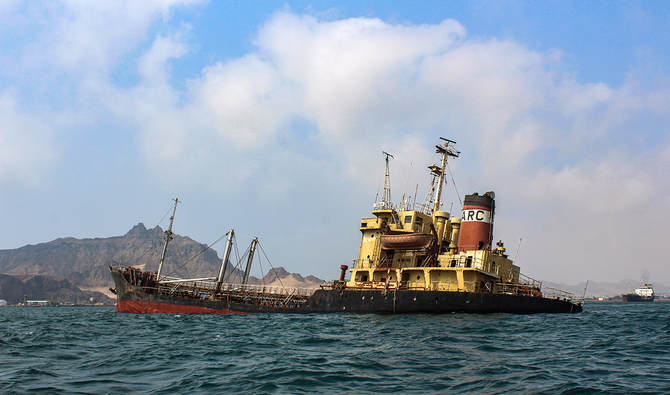AL-MUKALLA: Following Tuesday’s huge explosions in Beirut, Yemenis have been voicing their concern that the decaying Safer floating storage and offloading terminal could lead to a devastating disaster in Yemen if it is not repaired soon.
Having seen footage of the destruction wrought by the explosions in Lebanon, Yemeni fishermen, politicians, government officials, military officers and activists have urged the international community to pressure the Houthis to give experts from the United Nations access to the damaged ship so that it can be fixed.
The Safer has been stranded off the western city of Hodeida since early 2015. It reportedly carries around 1.1 million barrels of crude oil and has recently shown signs of rusting, with water entering the engine room. That leak prompted UN officials to warn of a major impending environmental disaster in the Red Sea, as well as the potential risk of a massive explosion caused by the build up of gases in the storage tanks, or by weaponry fired deliberately or accidentally.
Under pressure from local and international bodies, the Iran-backed Houthis, who control Hodeida, initially agreed to allow a UN team to board the ship to assess the damage and unload the oil. However, they later reversed that decision, citing a conspiracy between the UN, the US, and the Saudi-led Arab coalition.
Khaled Al-Rami, a Yemeni fisherman from Hodeida’s Khokha district on the shores of the Red Sea, told Arab News that his “first thought” on seeing the images from Beirut on Tuesday was that an equally devastating disaster could occur if the Safer spills oil into the water.
Last month, the Yemen-based environmental group Holm Akhdar (Green Dream) warned that an oil spill would have devastating consequences for fishermen, marine diversity, and the country’s fish stock.
“At least 115 of Yemen’s islands in the Red Sea would lose their biodiversity and their natural habitats. About 126,000 Yemeni fishermen — including 67,800 in Hodeida — would lose their only source of income because of the disaster,” the group said in its report.
“If the ship is not repaired, then after Lebanon, it will be Yemen,” Al-Rami said. “On WhatsApp, my friends and other fishermen shared their concerns about a predicted disaster from the ship. We are all worried about the impact of any oil spills on our lives. This is our major concern at the moment. It causes us great horror and panic. I appeal to the international community, the Arab Coalition and the UN committee (in Hodeida) to save us from a possible disaster.”
Nabiel Ali, also a fisherman from Khokha, told Arab News that his generation and his children’s would suffer the consequences of an oil spill from the Safer. “I urge the international community and all the good people in the world to find an urgent solution to this problem,” he said. “For the sake of humanity, please save Yemenis in general and the fishermen in particular.”
On social media, Yemeni activists echoed similar concerns about a possible disaster off the Yemeni coast.
“The Beirut Port explosion came to remind us of another imminent catastrophe that threatens Yemen and the whole world,” Mustafa Ghoules, a Yemeni journalist, said on Twitter. “The Safer tanker, which contains more than a million barrels of oil, is on the verge of leakage and explosion and is used by the Houthis as a weapon,”
Mohammed Saeed Al-Sharabi, an activist, called on his compatriots to save their country from disaster by emptying the decaying tanker before it is too late.
“The Safer tanker must be unloaded before oil spills and causes a major environmental disaster in the Red Sea. You must learn a lesson from the Beirut port disaster,” he said.
Abdullah Al-Saqqaf, another activist, called for mass protests across Yemen to pressurize the Houthis into allowing UN teams to maintain and unload the ship. “There must be popular demonstrations demanding the unloading of the tanker and exerting public pressure on the Houthis to abide by the United Nations resolution on the tanker,” Al-Saqqaf said.
The internationally recognized government of Yemen expressed its support for Lebanon and offered condolences to relatives of the victims of Tuesday’s explosions, according to a brief statement carried by the official Saba news agency on Tuesday night.
“We would like to assure everyone that the Yemeni community members are well and healthy and only two students were lightly injured,” the Yemeni Embassy in Lebanon said in a statement on its official Facebook page.

























